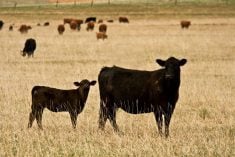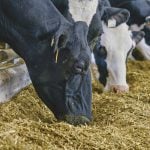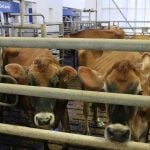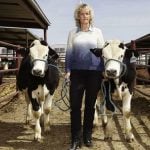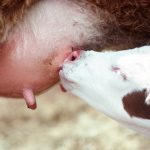Compared to last week, western Canadian yearling prices were down $2-$4 on average. The feeder cattle market was hard to define due to limited volumes; however, prices were down $2 to as much as $6 in some cases.
The Aug. 9 fire at a Tyson packing plant near Holcomb, Kansas set a negative tone for live and feeder cattle futures. U.S. feeder cattle market were down US$4-$8 on average; therefore, U.S. buyers were on the sidelines for Canadian feeder cattle. Corn prices in Eastern Canada remain quite strong and buying interest from Ontario feedlots was also subdued.
Read Also

U.S. livestock: Cattle futures sink on concerns over Trump’s push to lower prices
Chicago | Reuters – U.S. cattle futures tumbled on Monday, extending a steep slide after President Donald Trump complained last…
Thus, Alberta demand was the only home available for feeder cattle coming on the market last week. Buyers were hesitant to be overly aggressive due to weakness in nearby and deferred live cattle futures. Since late July, April 2020 live cattle futures have dropped US$9. Current margins on pen closeouts are in red ink in excess of $200 per head and it now looks like feeding margins in the deferred positions may not fare much better.
The feeder market has incorporated a risk discount due to uncertainty in fed cattle prices for the fourth quarter of 2019 and first quarter of 2020. The U.S. Department of Agriculture increased first-quarter beef production by 120 million lbs. in its Aug. 12 WASDE report. U.S. beef supplies in the first quarter of 2020 will be larger than earlier anticipated.
In central Alberta, larger-frame lower-flesh mixed steers weighing 955 lbs. were quoted at $183 while similar quality mixed heifers averaging 925 lbs. were valued at $160. The Alberta market appeared to hold a $3-$5 premium over Saskatchewan and Manitoba. For example, Simmental-blended lower-flesh steers weighing 825 lbs. were quoted at $189 but in central Alberta, medium- to larger-frame tan steers averaging 860 lbs. were reported at $192.
Ranchers are holding back on calf sales with expectations of higher values later in fall. Despite the tight forage supplies in Manitoba and southeastern Saskatchewan, limited numbers are coming on the market. In southeastern Manitoba, small groups of steer calves weighing between 500 and 550 lbs. were valued from $210 to $216 while similar-weight heifers were quoted from $180 to $187. Larger-frame black steers averaging 515 lbs. were quoted at $225 in central Saskatchewan. In southern Alberta, a small group of black steer calves weighing 433 lbs. were valued at $238.
— Jerry Klassen manages the Canadian office of Swiss-based grain trader GAP SA Grains and Produits Ltd. and is president and founder of Resilient Capital, specializing in proprietary commodity futures trading and market analysis. Jerry consults with feedlots on risk management and writes a weekly cattle market commentary. He can be reached at 204-504-8339 or via his website at ResilCapital.com.









